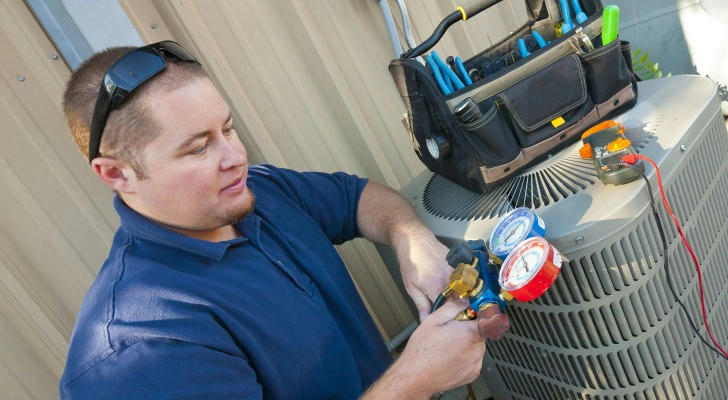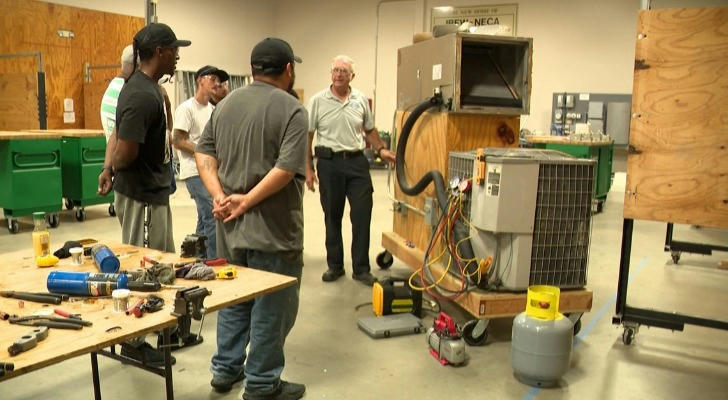HVAC Training Courses Supported by the U.S. Department of Labor
The heating, ventilation, and air conditioning (HVAC) industry plays a pivotal role in maintaining comfortable and safe indoor environments in homes, offices, and industrial spaces. In the United States, the demand for skilled HVAC technicians is continuously growing, fueled by the need for climate control systems in residential, commercial, and industrial settings. To meet this demand, the U.S. Department of Labor (DOL) has supported various training programs that equip individuals with the technical knowledge and skills needed to succeed in this dynamic field. These HVAC training courses are designed for people across different age groups, helping them transition into a rewarding career or upgrade their current skill set.

📈 The Growing Demand for HVAC Technicians
The HVAC industry is experiencing steady growth, with the U.S. Bureau of Labor Statistics projecting a 5% growth in HVAC technician jobs from 2021 to 2031. This growth is attributed to the ongoing need for the installation, maintenance, and repair of HVAC systems, particularly as building codes and environmental regulations evolve to promote energy efficiency. According to the BLS, the median annual wage for HVAC technicians was $50,590 in 2021, with many experienced professionals earning more.
With such a promising job outlook, it’s no surprise that HVAC training programs supported by the DOL have become increasingly popular. These programs offer individuals the opportunity to enter the HVAC field quickly and gain the necessary certifications to become competitive in the job market.
👨🎓 Age Groups and Career Transitions
For Young Adults (Ages 18-25)
Young adults just starting their careers can greatly benefit from HVAC training courses. Often, high school graduates may be uncertain about their next steps, and many seek technical training as an alternative to traditional four-year college degrees. HVAC programs provide a clear and direct path to employment, offering hands-on training that prepares them for entry-level positions in the industry.
For example, a young graduate in Arizona enrolled in a DOL-supported HVAC program through a local community college. After completing a six-month course, they gained valuable experience working on real HVAC systems and obtained certifications like EPA 608 Refrigerant Handling and NATE (North American Technician Excellence). Within two months of graduation, they secured a full-time position at a well-known HVAC company with a starting salary of $45,000 per year. This fast-track training allowed the individual to quickly transition into a stable and well-paying career.
For Mid-Career Adults (Ages 30-45)

Mid-career adults looking for a career change often find HVAC training programs appealing. These individuals may already have experience in technical fields such as electrical work, plumbing, or construction, and the transition to HVAC can be relatively seamless due to the overlap of skill sets. The DOL-backed training programs cater to those who need to upskill quickly, allowing them to leverage their previous experience while learning the specific technical aspects of HVAC systems.
Take, for instance, a 38-year-old individual from Florida who had worked in construction for over 15 years. Feeling the impact of seasonal work fluctuations, they decided to switch to HVAC to gain more job stability. They enrolled in a training program through a local vocational school that partnered with DOL funding. After completing the program in less than a year, they earned a certification in HVAC installation and repair and immediately landed a job at a leading HVAC service company. With their previous construction background, they were offered a salary of $55,000 per year, and within three years, they had moved up to a supervisor position with an annual salary exceeding $70,000.
For Older Adults (Ages 50+)

For older adults nearing retirement age, HVAC training presents an opportunity for a second career or supplemental income. With the DOL’s support, many individuals in their 50s and 60s have found success in entering the HVAC field. Older adults typically bring valuable life experience, reliability, and strong work ethics to their new careers. HVAC companies often appreciate the dedication and experience that seasoned workers can bring to the table, especially for customer-facing roles.
A noteworthy example involves a 58-year-old man from Texas who, after decades of working in retail management, decided to pursue a more physically engaging and stable career. He enrolled in a DOL-funded HVAC training program at a local technical college. Despite his initial hesitation about entering a new field, he was able to complete the program in just under a year. With his certifications in hand, he found a job with an HVAC company that valued his customer service experience. He started with a salary of $50,000 annually, and after just two years in the field, he received a raise and now oversees a team of technicians, earning $65,000 per year.
🛠 Supporting the Workforce Through DOL-Backed Programs
DOL-backed HVAC training courses are structured to meet the needs of a diverse workforce. These programs often combine classroom learning with hands-on training, providing students with practical skills that they can apply immediately in real-world settings. Certifications offered through these programs, such as the EPA 608 Refrigerant Handling certification and NATE certification, are crucial for securing employment and advancing in the HVAC industry.
Moreover, DOL-supported programs are accessible through various channels, including community colleges, technical schools, and vocational training centers. These institutions work closely with industry partners to ensure that the training is up-to-date with the latest HVAC technologies and industry standards.
🔚 Conclusion
The HVAC industry offers lucrative career opportunities for individuals of all ages, and DOL-supported training programs are a gateway to success. Whether you're a young adult starting your career, a mid-career professional looking to switch fields, or an older adult seeking new challenges, HVAC training programs provide the tools and certifications needed to thrive in this essential industry. With the support of the U.S. Department of Labor, more and more individuals are entering the HVAC field and enjoying long-term, stable careers in an ever-growing industry.
